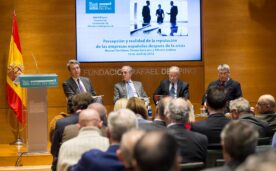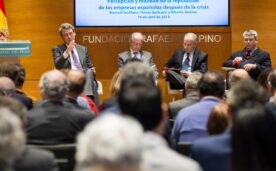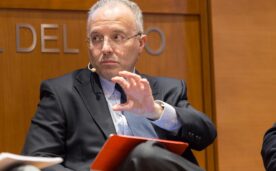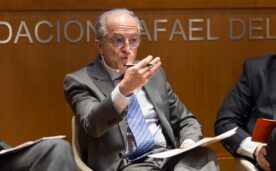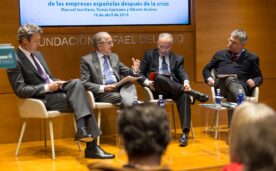Manuel Sevillano, Tomás Garicano, Alberto Andreu and Goyo Panadero
Summary:
On 16 April 2018, the dialogue on the perception and reality of the reputation of Spanish companies after the crisis took place at the Rafael del Pino Foundation, with the participation of Alberto Andreu, advisor to Ernst & Young, ATREVIA and Corporación Pascual; Manuel Sevillano, CEO of Merco, and Tomás Garicano, Professor of Finance and Corporate Governance at IE Business School. The dialogue began with a look back, to try to analyse where Spanish companies are coming from in terms of reputation. Manuel Sevillano explained that corporate reputation is something that tends towards stability; it is neither gained nor lost quickly. When analysing the rankings in terms of reputation in our country, there have been eight or ten Spanish companies that used to be there and now no longer appear. In general, reputation has been lost, not dramatically, but it has been lost. None of the companies preferred by university students to work for are Spanish. Experts and journalists rate foreign companies more and more highly and Spanish companies less and less highly among the 100 companies with the best reputation. On the positive side, however, it is worth mentioning that among the twenty-five companies with the best reputation in Latin America there are four Spanish companies, the second country with the most companies in the ranking after the United States, with ten. Alberto Andreu pointed out that before the crisis there was a lack of controls and little monitoring. All this has led us to understand that the reputation crisis is the result of poor management and poor corporate governance. Reputational crises are deeper because they have deep and systemic origins. So what happened to us happened because of the lack of regulation. As a result, Spain, as a country, lost its reputation, but it has been recovering it. The reports say that Spain's strengths have to do with its friendly and friendly people, natural environment, leisure and entertainment, lifestyle and security. Where there is room for improvement are ethics and transparency, international respect, institutional environment and social welfare. In this respect, we have improved since 2005. But you have to bear in mind that if you play in a country with a poor reputation, the companies that play in that country are tarnished. For Tomás Garicano, the importance of reputation derives from the fact that it is the result of the fact that companies have stakeholders who have certain commitments and assume certain behaviours. Having said this, he pointed out that, in Spain, we come from a situation in which corporate governance can clearly be improved in several areas: the one-dimensional vision, in which the only objective for the company is to create value for the shareholder; the lack of absolute commitment in everything that has to do with corporate social responsibility, and sectors whose example has been bad, such as banking, because they have not done it well. Alberto Andreu pointed out that banking, telecoms and oil lead the ranking of the worst reputation. According to Tomás Garicano, there are three factors that influence the deteriorated image of our country and, therefore, of Spanish companies: corruption, the economic crisis and the territorial crisis. We are probably recovering from the economic crisis, but the issues of corruption and the territorial crisis are still pending. Moreover, there has always been a black legend in Spain that people love to highlight. Manuel Sevillano added that reputation often acts as a buffer against image problems, which can be temporary. That is why reputation is not lost overnight. In Spain we have some companies that do things reasonably well, but perhaps we pay too much attention to certain negative news. We have a handful of companies that can stand shoulder to shoulder with any company in any other country. Tomás Garicano, on the other hand, believes that it is possible to lose one's reputation overnight and gave as an example the case of Arthur Andersen, which was unassailable and yet disappeared in two months. In his opinion, when a company finds itself in a situation where people's perception is worse than reality, it can drop like a dead weight. For his part, Alberto Andreu insisted that major communication scandals have little effect on the measurement of reputation in deferred time, because for perceptions to change by two digits it has to be a full-blown scandal. Seven years after the beginning of the crisis we are better off today, because society no longer eats what it used to eat, such as corruption scandals, which cost votes. Moreover, we have better regulation than we had before. We also have better regulation than before, such as the law on financial governance, which calls for defining who is responsible for what. We also have the capital companies law, which gives the board non-delegable responsibilities, as well as the code of good governance and the royal decree on financial information. This body of legislation helps us a lot. In this respect, Tomás Garicano indicated that, in Europe, investors now prioritise everything that has to do with socially responsible investments, and with a vision that goes beyond the wealth of the shareholder. This can only be achieved by incorporating a strategic vision that considers these factors as relevant. In the US, on the other hand, this is still in its infancy. Manuel Sevillano recalled, in this respect, that Spanish companies are perceived as having a better commercial and management quality proposition than their data suggest, and a worse labour proposition. He also added that, in an environment of hyper-transparency such as the one we have, you cannot say what you are not. Reputational risk is when the gap between perception and data is too big. To solve it, you have to change the culture of the company, the processes. That is the big problem of how to deal with reputational crises. The way to do it, according to Tomás Garicano, is to have a reputational risk management model, which has several phases: identify, evaluate, manage and follow up. Facebook has not identified and managed a reputational risk map. For that you have to have your management and response systems. Alberto Andreu pointed out that there are a couple of things about Facebook that change the picture. They are companies that are born in an environment where there is no regulation and they are going to become the new incumbents. There is a very important element which is asymmetric regulation. He also recalled that all self-regulatory circuits have ended up in legislation. Even so, regulators are still years behind the reality of the market. The regulator is still stuck in the 20th century and the reality is different. And for things to work, there cannot be asymmetric regulations in the same sector. It may be necessary to have common rules of the game. Regarding fake news, governments have to update their regulatory system to the 21st century and provide judges with adequate legislation.
The Rafael del Pino Foundation is not responsible for the comments, opinions or statements made by the people who participate in its activities and which are expressed as a result of their inalienable right to freedom of expression and under their sole responsibility. The contents included in the summary of this conference are the result of the debates held at the meeting held for this purpose at the Foundation and are the responsibility of their authors.
The Rafael del Pino Foundation is not responsible for any comments, opinions or statements made by third parties. In this respect, the FRP is not obliged to monitor the views expressed by such third parties who participate in its activities and which are expressed as a result of their inalienable right to freedom of expression and under their own responsibility. The contents included in the summary of this conference are the result of the discussions that took place during the conference organised for this purpose at the Foundation and are the sole responsibility of its authors.


